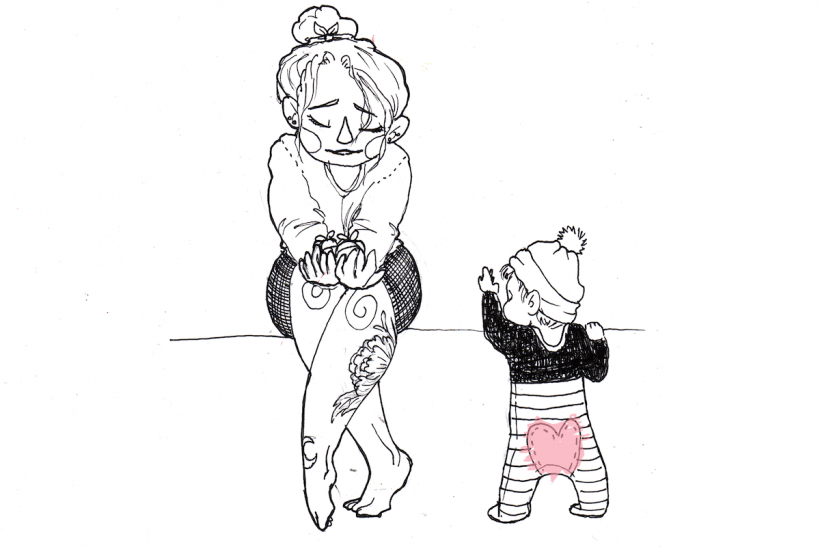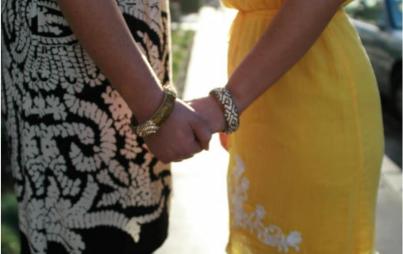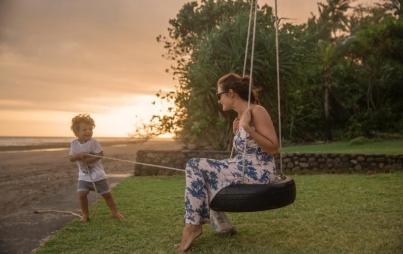
Should We Have A Second Child? Image: Mariah Sharp @MightyMooseArte
Long Reads is a bimonthly feature, showcasing long-form essays.
It was a rainy Saturday evening when my husband uttered the words that shattered my life plans.
We were driving home in the gray light, me in the backseat next to our 18-month-daughter, my hand brushing her car seat, helping her nod off to sleep, Solomon in the front driving like Miss Daisy.
“I am not sure our relationship can handle another child.”
BAM. WHAM. BOOM.
Me, in shock.
From the moment the baby was born, I’d been obsessing about a sibling: When will my period come back? I thought as I suckled the babe on my boob for what seemed like hours at a time while my husband slept through the night. How much weight do I have to lose before I get pregnant again? I wondered as I scarfed down more munchies to keep up my energy for said breastfeeding habit. What is the ideal age difference between kids? I typed on my mommy groups in the middle of the night as if I had the power to decide such things that were, for me at least, up to science.
In all my mind’s peregrinations of this discussion, I imagined we would talk about process, as in which IVF doctor we would go to; space, as in how would we live in a New York apartment with two kids; finances, how could we afford it if I hadn’t gone back to work yet (what is “going back to work” for a freelance writer with a baby at home? is a different question I had yet to figure out); and childcare, as in, who would do it.
But not once, not even in my most sleep-walking, cake-scarfing, manic mom blitzed-out moment did I ever consider the topic up for debate. We were going to have another child.
When I thought about our second child, I was not considering Us, the Parents. I wasn’t thinking about Me the Mom, Me the Journalist, Me the Person. I certainly wasn’t even considering Him, my husband. (Maybe that was the problem.) I was mostly considering Her, The Baby.
My handsome Israeli husband, unlike the reputation of his countrymen, was as non-confrontational as possible and had been assiduously avoiding all my informal lobs. “Next kid we’re going to sleep train at two months.” Or: “Don’t put the newborn box at your brother's, we may need it soon.” Silence.
Until that night. Sitting in the car, listening to the pitter patter of the rain, the squeak squeak of the windshield wipers, the wheeze wheeze of the baby’s stuffed nose (see what I mean about my brain? It’s onomatopoetic even when she’s asleep), I wondered what he meant that we wouldn’t survive another baby.
Stay calm, Ames, stay calm. (Woman Responsibility #274: Do. Not. Overreact.)
Me: “I thought we were doing pretty well, considering. You know, first-time parents, and all,” I said in a soft voice. I mean we’d just had a baby! After four years of infertility! And I was nursing! And trying to work from home! With him working from home too! And she was amazing! We’d done an amazing job!
Him: “Well you just seem so resentful all the time.”
“I am?” I said, staring through the wet window at the blurring road lights. Maybe I wasn’t ecstatic about having to put the baby to sleep and get up in the middle of the night and the early morning to breastfeed, or never getting to complete an assignment all at once, or having to try still to make money while caring for a kid, but mostly I was just tired. Bone tired. Headache tired. Dizzy tired. Can’t think tired. Can’t clean the house tired. Tired like all new moms are.
But what did that have to do with anything?
When I thought about our second child, I was not considering Us, the Parents. I wasn’t thinking about Me the Mom, Me the Journalist, Me the Person. I certainly wasn’t even considering Him, my husband. (Maybe that was the problem.) I was mostly considering Her, The Baby.
Did she need a sibling or not?
Solomon and I had always planned on having two children. “Planned,” HA! In the infertility world, that reminds me of the old Yiddish phrase Mann Tracht U Gott Lacht: “Man plans and God laughs.” Somewhere around my fourth miscarriage, I’d given up on the Big Guy and started to hum the Depeche Mode (now back in concert!) lyrics, “And I don’t want to start any blasphemous rumors/but I think that God has a sick sense of humor/and when I die I expect to find him laughing.”
We’d put in two embryos every time, but only one stuck.
Numbers are my life: 10 doctors, nine rounds of IVF, two donors, five pregnancies over four years in three countries to have one baby at age 45. A million-dollar baby — a hundred-thousand-dollar baby at least (although a million sounds better). A baby girl who amazes us every single day.
Yes, I know all parents say that about their kids, but parents say this to us about our kid, who is intelligent, playful, exuberant and — whatever. It doesn’t matter: You get it. We love our kid.
But now I was left wondering if she would be our last.
Let it be said that at the time I did not respond further to his verbal gauntlet. A challenge, it took me weeks to realize, that had many layers and nuances:
- You’re not happy enough to merit a second baby.
- You’re not nice enough to me that I’d want a second child.
- You don’t make enough money to have a second child.
- You’re not a good enough mom for a second child.
- You not smart enough (and goddammit!) people don’t like you.
I felt as inadequate a person as I’d ever been made to feel (and that’s saying a lot for someone who went through infertility).
I’m not really a good wife or roommate, I thought, staring at loads of dishes in the sink. If I want to send my daughter to daycare full-time, I’m probably not a good mother, either. And this after I promised myself — no, swore sideways, during all my failed pregnancies while I was forced to listen to whiny deprecating mothers putting themselves down — that I’d never judge myself if I got to be a mom. (Of course, I said I’d never complain about anything about mothering either, but that went out the drain after about four months). And here someone was judging me.
As distressing as these silent accusations were (and admittedly truthful, since I was less effective as a homemaker as I’d envisioned myself and hadn’t bounced back to my former self either physically and emotionally, and definitely did not give my husband the attention he had pre-baby), I did not respond for one simple reason: In the face of my husband’s ambivalence, I wondered: Did I really want a second child?
If I pressed forward on this issue with Solomon, I would push us into separate corners, arms up, ready to punch. He could put down his foot and say no, and I would be left yearning, fuming, more resentful than before. Which would be a shame, since I did not know the answer inside myself, and I did not have much time to figure it out. (Because we were using a donor I had more time than most women using their own eggs). Nor, did it seem, could I figure it out with him.
And so I retreated. To decide for myself.
By “myself,” I mean asking everyone I knew about the subject.
“The hardest thing in life is a mother who wants more children than she can have,” said a colleague, a mother of three girls. I vehemently but silently disagreed. The difference between zero and one is infinite. The difference between one and two is infinitesimal. The woman who has two but wants three? The dad who wants a son but has a girl? Nada. Nothing compares to the pain of being alone with zero.
Is this the way it works in the world, with women everywhere wanting one more child than her partner? My own Orthodox childhood proved otherwise. Had I been a boy — that glorious progeny who could accompany my father to synagogue and do all the mitzvoth with him, the way a mere girl couldn’t — my parents probably would have stopped at two, my older sister and me. But no, after me came another girl, all but forgotten when my brother arrived two years later.
Who decides in a couple who gets to stop having children?
“Every woman has the right to have as many children as she wants,” said my friend Bella, a young single woman a decade and a half my junior, so romantic and so naïve about what women — married women — get to have and not have.
“It’s our biological destiny,” she tells me. As someone who grew up religious and spent most of my 20s and 30s trying to escape the biblical commandment of “Being Fruitful and Multiplying,” I never thought having children was my destiny. In fact, I never thought I would be a mother, never yearned to be one. It wasn’t until after I got pregnant without trying a few times and then failing that I realized that I might want to mother many. That somewhere in an alternate universe was a me surrounded by a gaggle of kids, drowning, laughing, loving it all.
“This could all be solved with a few morning blowies,” said my friend Allie, a mother of two who knew what it took to make men happy.
“But Ames, can you really handle another kid?” she said. She’d known me for 20 years (since I was in my mid-twenties when kids were the furthest thing from my mind, and she was desperately trying to stay pregnant like I would many years later). “You have to be really certain you can do two,” she said gently. She wasn’t critiquing my house cleaning habits (or lack thereof) or even my nocturnal ones; she was just trying to get me to face reality beyond What He Wants and What I Want.
“The second child is the one that killed them,” said a writer acquaintance, Ed. We were at a book party, and it turns out he and his wife have one daughter in grade school, and so, of course, I asked him if they’d considered having another. That’s what I ask people now when Solomon’s not around. I ask people with two if they always knew they wanted a second because I can’t ask them if they’re sorry they had the second. (Although abortion statistics surprisingly show that a majority of mothers who terminate have at least one child!) The room was loud and crowded. I was at the bar pressing in for a watered-down drink, and it seemed like the last place to have a serious discussion beyond, “hi, how are you?," but since I had a kid I’m incapable of small talk or chatter unrelated to parenting.
“We thought about having another, but then we’d have to move out of the city, and my wife would have to switch jobs, and truthfully, that’s what did all my friends in,” he said, allowing me a vision of the world no one talks about: the men’s side. His friends complained the second one killed their sex life, their finances, their ability to travel, to work creatively. It reminded me of the Atlantic article "The Secret to Being Both a Successful Writer and a Mother: Have Just One Kid."
And so it seemed like an answer was emerging. My husband didn’t seem to think I could handle it — or we could handle it. My oldest friend wasn’t even sure. Men everywhere were drowning from another child late in life. And writers — successful creatives everywhere — managed to shine only if they had one.
So why couldn’t I wrap my head around the idea?
You Might Also Like: I'm NOT Selfish For Having An Only Child (So Mind Your Own Business)
One night after our blowout, we were at the diner with our tyke in tow. Behind our booth was a couple with their teenage daughter who turned around to make faces at the babe. I was happy she was making my daughter laugh, but I felt so bad for her. Wasn’t she bored with just her parents? Did they think themselves so wonderful that they could have her and give her nothing else? I know it’s trendy these days for the childfree to call parents “selfish” for overpopulating our already-diminished Earth, but I think the opposite: how selfish is it to create only one child and stick them with you?
Every time I see a “single” child — that’s the PC terms for onlys — I feel a pang. Unlike Chelsea Clinton, who had to shoulder the burden of her father’s infidelities and her mother’s suffering, alone, Malia and Sasha Obama got to sequester themselves (from no parental scandals) with each other. PS. Chelsea now has two kids.
Look, it’s not like I had such wonderful sibling relationships growing up. My sister, four years older, couldn’t stand me since the day I was born and actually doesn’t speak to me or any of us to this day (the danger of waiting too long to bring a second?). My younger sister, also four years apart, was the classic ignored middle child (eating disorders and all) and did not form a solid relationship with me until we were out of the house and in our twenties. My baby brother was everyone’s favorite, and although I always loved him dearly, at six years my junior and at different schools and camps, he did not provide the proverbial sibling bonding I had later heard about it in life but never experienced myself.
Throughout my inadequate childhood, I was grateful to my siblings nonetheless.
Every time my mom would go into one of her emotional shut-downs (they could last for weeks back then), every time my dad would stomp down to the basement and feel the hot buzz of the just-turned-off TV and demand who was breaking his rules about watching on a school night, I would think, Thank God I’m not in this alone with them. They wouldn’t make the Worst Parents in the World List — no physical or sexual or verbal abuse, no drinking, drugs, smoking, etc. — but they’d barely make The Decent Parent List either.
I was grateful to my siblings because they — my sisters, The Problem Children, and my brother and I, The Ones Who Didn’t Need Worrying About — could take the fall in my stead. Growing up in a three-story house where no one was ever sure where anyone was (or even at home), we did not have that much to do with each other, but it was a cold comfort to know there was someone else there.
My parents divorced when I was 23, and over the years I became closer to my younger sister and brother — who both have babies the same age as mine. We’re adult closer, though. Not the, Do-you-remember-that-time-on-family-vacation-when…? Because I certainly don’t, and we didn’t have those kinds of experiences. And so I don’t want to give my daughter a sibling to recreate a relationship I don’t have as much as to give her an ally against….against….against us.
Which is a weird thing to protect your child against. Solomon and I are nothing like my parents (who, to be fair, married when they were in their early 20s and had no choice but to stick together for three more decades until divorce became socially acceptable and have become much nicer and more competent since). Despite my husband’s recent revelation on what he thought about the State of Our Marriage and How It Would Collapse with a Second Child, we get along decently for two people who don’t get much sleep and live with the terror of a toddler constantly strewing things about that were just put away (The “eat it or wear it phase,” if you will). I’m not saying another baby would help, but I think I could make it through more unscathed than the first time around.
No, I can’t have a second child just because of my own terrible childhood.
The whole point of me having a family — despite said lack of maternal instinct — was to repair all the damage of my first family.
Besides, research shows that only children are more creative and flexible than kids with siblings — though less agreeable. That sounds like our daughter — so, so smart and sociable, and exuberant, unless someone even looks at her stuff. (In fact, at the end of her first year in daycare she actually failed “sharing” on her report card. Okay, it said, “needs work” as did “caring about others” but I took that as a fail.)
Like the new childless demography, parents of only children are fiercely defensive about their choices. Lauren Sandler, author of One and Only: The Freedom of Having an Only Child, and the Joy of Being One cites the research of 35,000 Danish twins: women with one child said they were more satisfied with their lives than women with none or more than one. She writes “Social scientists have surmised since the 1970s that singletons offer the rich experience of parenting without the consuming efforts that multiple children add: all the wonder and giggles and shampoo mohawks but with leftover energy for sex, conversation, reading, and so on.”
I get it: parenting one is easier. But is it really parenting?
“Are you saying having one child isn’t a family?” said my gay best friend Jeff, his voice rising. He’s joyfully childless, in and out of relationships with varying degrees of monogamy: i.e., as unlike me in every way possible. So I have to watch what I say around him on this subject (actually, I try not to talk about kid stuff with him at all, focusing mostly on writing and relationships).
“No, not at all!” I said, even though that’s exactly what I was saying.
I don’t want to give any lip service to the conservative right-wing definition of families — a man and a woman with 2.2 kids, etc. Intellectually I believe there are all different types of amalgamations that make up a family. I mean look at mine — six people entirely genetically related with one ultra-Orthodox rabbi (my brother), at least one ardent Trump supporter (my father), one cut-off sibling (my older sister), and little familial connection. Your family can be defined any way you want it to be.
And yet.
When the baby was born, I marveled at people sending love and regards to our “family.”
“We’re a family?” I said to Solomon.
“Of course, what else would we be?” he replied.
“A couple with a kid?” That’s what it felt like to me then, and that’s what it feels like now, still. Of course, Solomon thinks it’s my religious upbringing. Still, when people asked me, “How do you like motherhood?” I could never answer them on the State of the Maternity. I only knew I loved my daughter. To talk about “Motherhood,” it seemed I would have to have more than one. Half the time I don’t even feel like a “mother” — that separate identity, Goddess of Sacrifice, Slovenly or MILFy, Maternal Figure. I’m just me, and I have a daughter.
Would having a second child change that — make me feel like a “mother,” a “family?”
I don’t know. The toddler is two now, and I’m no closer to an answer than I was six months ago. Sure, there have been more blowies, more sleep, more work, more paychecks (although less than either one of us would like), more laughter. But I still can’t give away her clothing, still can’t stop reading the mommy blogs about breastfeeding woes or looking at my mucous viscosity and wondering if I could get pregnant this month. (Like those urban myths of the older mom who tried IVF for years, then moved on to donor eggs or adoption and then suddenly fell pregnant on her own.)
“Oh I’m so dooooone,” said an about-to-pop pregnant mom I ran into at Mommy&Me. Our daughters are the same age, and she’s about to have another girl. But she hates being pregnant so much that her husband says he suffers almost as much as she does (As IF). “I know it in my bones I don’t ever want to be pregnant again,” she said.
My bones don’t know it.
My milk has only recently stopped coming out of my “boobies” as the toddler calls them, laughing, amazed that she ever drank from them. I want to rest my hands on a protruded belly. Waddle like a penguin with cankles. Fall asleep at 8 pm with the rosy glow of hormones coursing through my veins.
Of course, I imagine this time I would be able to actually enjoy a pregnancy, not dread my weekly doctor’s appointment, worried I’d be seeing an arrested fetus on the grainy ultrasound screen. My second pregnancy would be confident, joyous…. normal.
And so would my second child, I muse. I’d know how to breastfeed instantly, letting Solomon take over the night feedings (and pumping would be a breeze, and my milk would be copious). I’d sleep train the new baby at three months, not feeling bad about letting him cry it out. The new baby would be doing tummy time from the start, no matter how much he shrieked. And the perfect daycare around the corner (that took me three months to find) could take him at six months.
Who am I kidding? I want another one. Now I just have to convince my husband.
Should linens be sorted by sets or by type: fitted sheet, flat sheet, pillowcases, quilt cover? It’s a Saturday morning, and I’m blessedly alone, in a way I ostensibly wouldn’t be able to if we had another baby, and I’m furiously sorting the laundry. (Don’t worry, I haven’t gone all domestic; I don’t actually do it as there are no machines allowed in our building).
There must be a solution to this sheet question. There has to be a solution for my life.
I'm feeling a flash of furious at my husband. How could he just decide this on his own, changing our long-held plans? It’s been so long since our initial discussion, and we’ve never revisited it. I’m still intermittently angry, like picking an old scab when I’ve got nothing else to do.
I decide to stack the laundry by sets: all the blue and white sheets and pillowcases will go in one pile, all the plum ones in another. But then I see that some of the sets have pieces missing: the yellow one only has one pillowcase; the mint green top sheet was torn by our Airbnb guests, and I have to throw it out. I’ll have to resort it by sheet type.
When I used to glare at those women with kids in the fertility clinic trying for another, I promised myself I wouldn’t ruin my life in pursuit of a second child. But isn’t that what I’m doing?
And it hits me, then and there in the midst of the mundane madness: There is no one way to do it. Not for everyone and not for me. And I’ve devoted so much time thinking about the subject — definitely the sheets but also about the second child — that I’m missing out on what’s transpiring right in front of me: a gorgeous family.
During the four years that I was trying to get and stay pregnant, dozens of well-meaning friends and strangers were telling me to be grateful for what I had. Not all of them were idiots — some were single, envious that at least I had a partner, marrying after 40; others were childfree and loved it, and some were so mired and tired in parenthood that they were nostalgic for the glory days prior.
But it’s hard to be appreciative of what you have when you want a baby so badly, when they keep taking hold of your uterus but never quite sticking. Those childless days were endless: yeah, great, another movie, another play, another party, another article published, another paycheck. So sad, Solomon and I and my convulsive womb. I should have appreciated my life as is but I could not.
And now I mostly do. God, I love this growing girl, so achingly alive she bursts out in song and dance the moment she wakes up. I like my husband even on the worst days — and I’m finding like is often more important than love in this parenting situation.
When I used to glare at those women with kids in the fertility clinic trying for another, I promised myself I wouldn’t ruin my life in pursuit of a second child. But isn’t that what I’m doing?
It’s possible I will try for another child and not have one. It’s possible we will not even try because of finances, because of space, because of Solomon, because of me. I am beginning to see the life in front of me, watching that mother of many fading away like a Sliding Door.
I have to stop. I have to love this life now, no matter what the future will bring.
You know how the moment you stop being desperate to get back together with an ex, he somehow senses it and decides he wants you back?
That’s what happened with Solomon.
“I was thinking about what we were talking a second kid,” Solomon said. My heart was in my gums. This was it: he was going to offer his proclamation.
“And I still have some concerns, but if that’s what you really want, and that’s what’s best for her, well, we should consider trying.”
Wait — what?
All of a sudden, all of those yearnings — for a boob suckling baby at my breast, a creature who needed me for her very life (instead of “No Mama, do it myself!”) — seemed less like a wish for the future and more like nostalgia. Not another child, just a way to do it over. And girl, puhleez, would I really be able to do a better job the second time around while there was another feisty and demanding child in tow?
The child. She’s two. She doesn’t seem to miss having a sibling — someone vying for dear dad’s and mom’s attention. (Yes, she’s starting to like him better now too, one reason to have a second, an ally.) She has a cousin her age. A bunch of only children with older moms around, too.
Time isn’t endless — even though we have the “luxury” of a using a young donor’s eggs (a dubious luxury, since of course, I’d have preferred my own). We will have to make a decision soon: what’s better for our daughter, for my husband, for me, for our family.
Yes, after all of these peregrinations, viewing my fractured past, my imperfect present, my images of a future, there’s only one thing I’ve learned.







